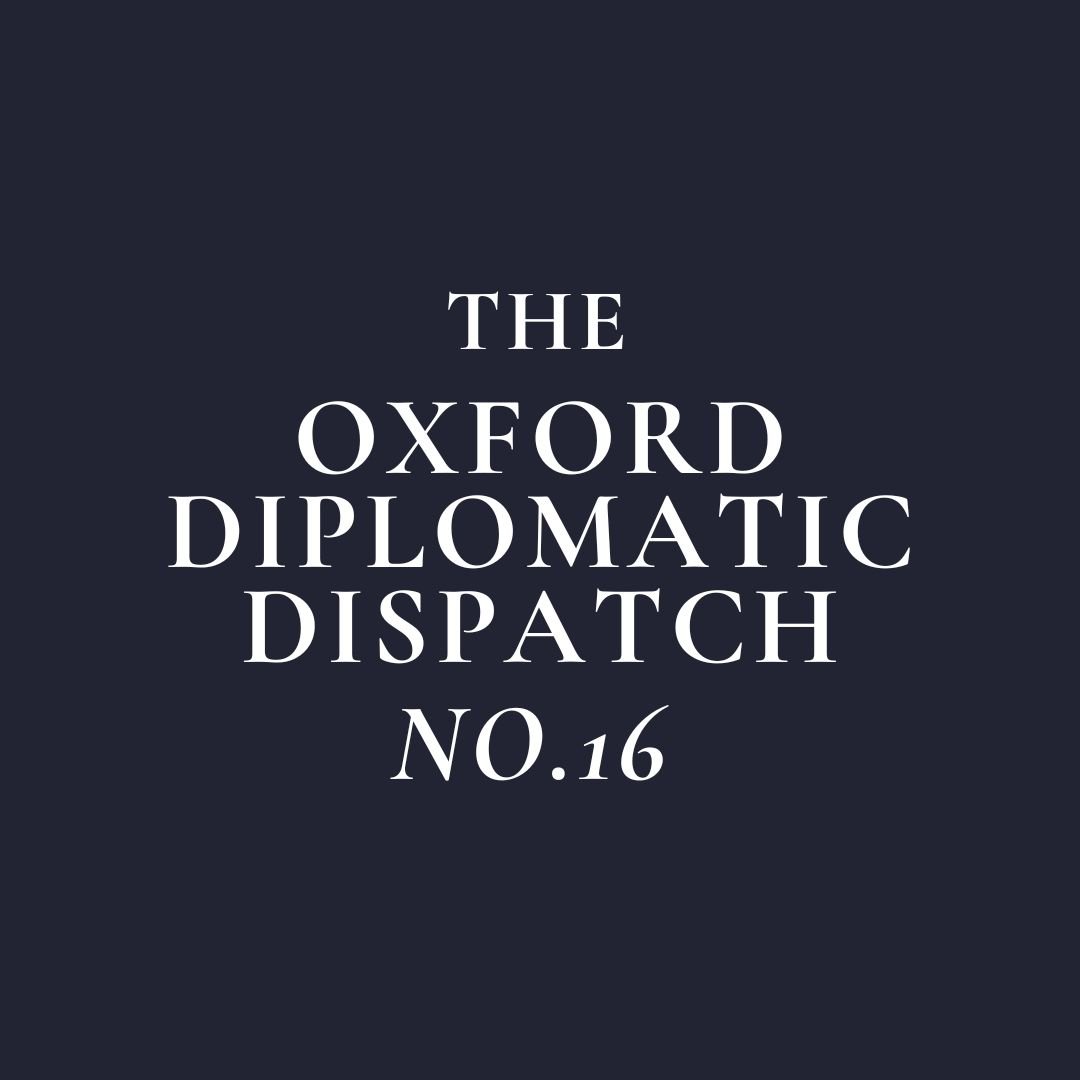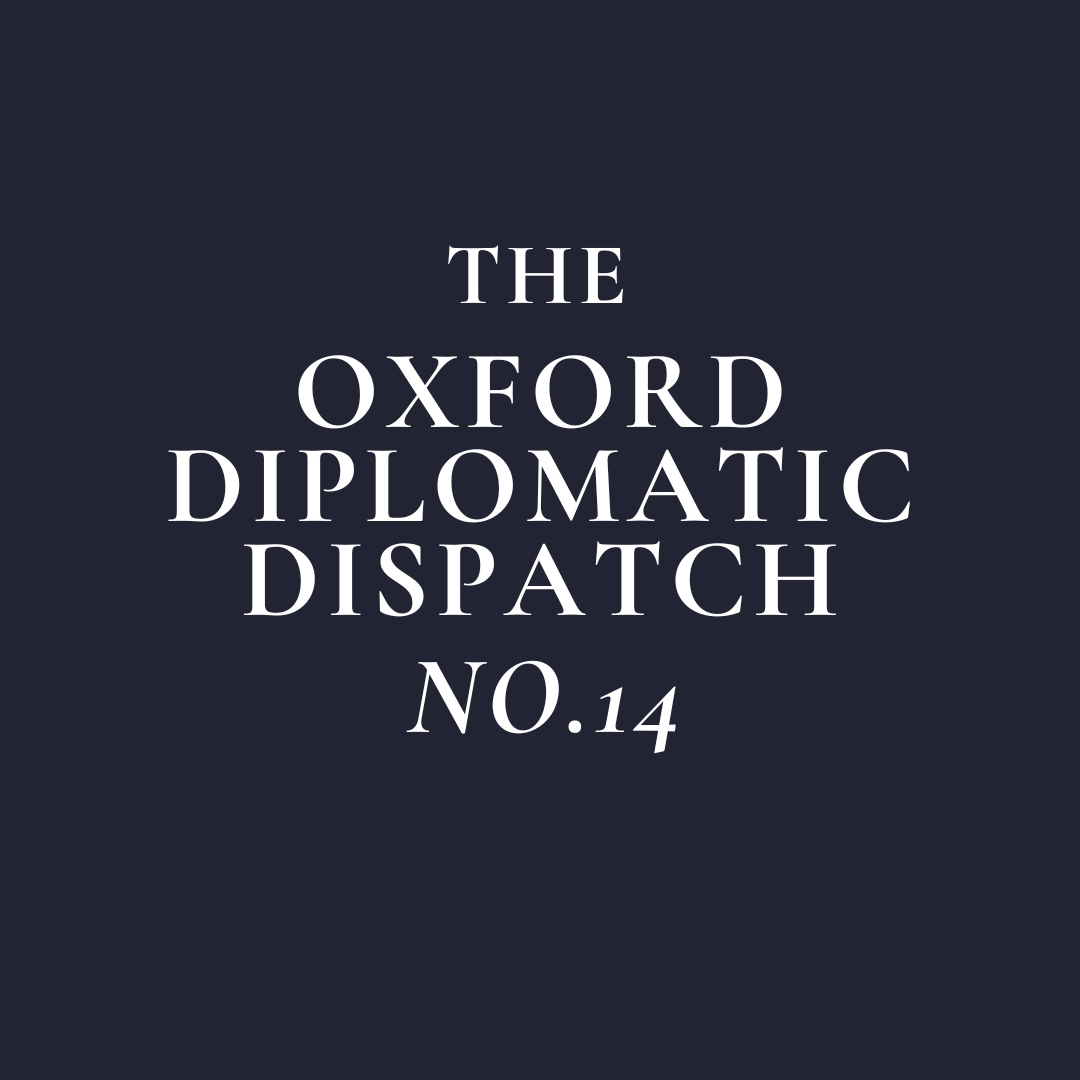Welcome
Read current and previous editions of the Dispatch below.
Find out more about us and how to contribute here.
I sincerely hope you find the following pages engaging and intuitive.
Caitlin Morgan & Jeffrey Love
Editors-in-Chief

Dispatch No. 19
The last issue of the 2024-2025 academic year is shorter, highlighting the salience of exam season for both our student contributors and hardworking editors. However, across six articles, this issue explores issues ranging from geopolitical maneuver in Latin America to shifting alliances in the Middle East, solutions to the Israel-Palestine conflict, and the difficulties with recovering from war. The Dispatch will be handed off to a very capable set of new editors next year, and we look forward to what they will publish!

Dispatch No. 18
The first issue of Trinity term 2025 highlights growing fragmentation in the international system, with multipolarity as a key theme across many of the pieces. Our eleven contributors tackle topics such as the unpredictability and unstable nature of the Trump Presidency and lingering questions of whether peace and stabilisation can be achieved around the globe. This edition features guest contributions from authors at the United Nations, the University of Utah, the University of British Columbia, the Global Awareness and Impact Alliance, and elsewhere.

Dispatch No. 17
The second edition of 2025 primarily focuses on a return to multipolarity and local political struggles. Our nine authors engage with questions such as how to secure undersea internet communication networks, how can post-colonial societies relate to and interact with their former empires, how should China engage with regional blocs, and what happens with barriers to interaction between great powers are crossed? This issue features guest a contribution by two experts at Bait Al Amanah.

Dispatch No. 16
The first edition of 2025 highlights growing insecurity across the globe. A key source of uncertainty across all regions is the new Trump Administration’s erratic and inconsistent foreign policy. Our twelve authors engage extensively with questions of how stability and instability are affecting regional phenomena, from global scientific cooperation to the war in Sudan and the unwinding of the Biden Administration’s latticework of alliances in the Asia-Pacific. This issue features guest contributions from the Carnegie Endowment for International Peace, the EU Special Representative for the Horn of Africa, journalists, professors, and elsewhere.

Dispatch No. 15
The second edition of 2024/25 deals extensively with the outcome of the 2024 U.S. election and its implications for international politics. It features regional updates from the United States and Latin America and articles on topics such as the U.S. Navy, Democratic backsliding, advanced technologies, post-war recovery, and relations with China. This issue features guest contributions from esteemed authors at the Financial Times, The Economist, Brazilian Report, and elsewhere.

Dispatch No. 14
The first edition of the 2024/25 academic year offers renewed coverage of pressing global challenges. It features the first regional updates by the Dispatch’s new editorial team and diverse topics such as U.S. trade policy, the Venezuelan diaspora, the Georgian elections, the Sudan crisis, Iranian strategy towards the Eastern Mediterranean, Japanese reactions to Chinese grey zone tactics, and an overview of the many elections which took place in the Indo-Pacific this year. This issue marks the introduction of the Eastern Mediterranean as a region of interest, and starts out with an article from a member of the Board of USAID’s Middle East Partnership for Peace Fund. It also features contributions from several students and professors at Oxford.

Dispatch No. 13
The final edition of the 2023/24 academic year offers a global perspective on pressing international challenges and emerging diplomatic trends. It features end-of-year summaries from regional Editors and explores diverse topics including Gabriella Kchozyan's examination of global health diplomacy and Dr Marsha McGraw Olive's analysis of Central Asian cooperation. Tim Eaton discusses human smuggling in Libya, while Angus Kingsley-Anderson considers Israel-Palestine peace processes. Henning Melber and William Piekos offer forward-looking pieces on South Africa's 2024 elections and Pacific Island competition, respectively. Oliver Smith and Anton Rizki Sulaiman address crises in New Caledonia and Indonesia, whilst Ian Seow Cheng Wei, Sébastien Maillard, and Fiona De Cuyper examine China's regional security, the EU's political landscape, and Arctic governance, providing a comprehensive view of contemporary international relations.

Dispatch No. 12
Key articles examine Milo Vinikas' internship at Turkmenistan's Brussels embassy, the Gaza war's impact on Jordanian engagement by Layan Ounis, Israeli settler expansion affecting Palestinians analysed by Yonatan Kanonich of Yesh Din, UN peacekeeping efforts in Sub-Saharan Africa evaluated by editor Tom Wells, the environmental crisis in Guadeloupe reported by Karina Chabour of France 24, India's election season and climate urgency by editor Julia Hoffmann, implications of UK Foreign Secretary David Cameron's meeting with Donald Trump analysed by Patrick Breeze, and gender bias in multilateralism affecting women diplomats raised by "Ms. Bol.", an anonymous diplomat.

Dispatch No. 11
This issue covers Armenia's changing foreign policy including insights from H.E. Tigran Balayan, Armenian Ambassador to Belgium, developments like Georgia's "foreign agents" bill and the Georgian Programme at Oxford, securitisation of Tajiks in Russia, evolving Tajikistan-Iran ties, the aftermath of attacks on Jerusalemites by Asma Odetallah of Grassroots Al-Quds, charitable organisations Farm Africa and Girls Talk Organisation in eastern Africa and The Gambia, China's "Blue Dragon Strategy," Japan's regional positioning, and tensions between Venezuela and Chile.

Dispatch No. 10
Contents explore the widening Gaza war effects including the Houthis' role analysed by Ambassador Gerald Feierstein, Israeli-Iranian tensions in Syria by journalist Siba Madwar, Armenia's solar energy reducing Russian gas dependence underscored by editor Gabriella Kchozyan, Kazakhstan's "Multivector 2.0" policy by Wilder Alejandro Sánchez, viability of the "Chip 4" coalition against China's semiconductors evaluated by Brian Kot, Tunisian youth climate activism spotlighted by Ahmed Elhadj Taieb, and critique of US-British intervention undermining Brazil by Sophia Santos-Pearcy.

Dispatch No. 9
This edition examines the difficulties in achieving Armenia-Azerbaijan peace by journalist Lindsey Snell, Armenia's wine sector revival as gastrodiplomacy by entrepreneur Karen Tsharakyan, Netanyahu's conflict management strategy undermining the Oslo Accords analysed by Dr. Roee Kibrik of Mitvim Institute, Hamas' complex weaponry sourcing explored by Jack Jacobs, Jordan's perspective by politician Dr. Rawan Al Hiyari on the Gaza crisis and UNRWA's importance, the debate on Chinese investment in Angola by Rui Verde, tensions between legitimacy and legality in disputes by Tabitha Spindler, India's nationalist strategic posture analysed by Patrick Maxwell, and the rise of Hindu nationalist soft power by Mayank Kumar influencing Indian diplomacy.

Dispatch No. 8
Key contents include analysis of Georgia's Black Sea security role by Natia Seskuria of RUSI, Benjamin Remler-Nougayrede on Eurasian trade paradigm shifts involving Iran and the CIS, insights by editor Fiona De Cuyper on Russian-driven Arctic opportunism, Edwards Sanders on Polynesian climate migration, insights from Omar Al-Ubaydli of the Bahrain Center on the country's fiscal remittance strategy, and Regional Editor Tom Wells on the 2024 elections in Chad.

Dispatch No. 7
This edition features insights from H.E. Varuzhan Nersesyan, Ambassador of Armenia to the UK, analysis by Anatoly Motkin of the StrategEast Center on digital Central Asia as an IT hub, perspectives from Dr. Andreas Raspotnik, Dr. Andreas Østhagen on Arctic geopolitics and Xinran Sun on Russia's divided identities, a critique by Jonas Balkus of Western optimism towards India, highlights of Bahrain's milestones by Alanood Ebrahim Al Khalifa, discussion of Israeli humanitarian aid's role in Africa by Sivan Yaari of Innovation Africa, and evaluation by editor Igor of a potential second Trump term's impact.

Dispatch No. 6
The edition features insights from the Ambassadors of Georgia and Kazakhstan to the UK, an analysis of the Eurasian Economic Union's role in Central Asia, and an examination of how memory and guilt have shaped Germany's relationship with Israel. It covers Indonesia's successful political reforms, a report on a speech by former Colombian President Juan Manuel Santos, commentary on the de-historicisation of events in Gaza, a Lebanese diplomat's perspective on the migration crisis, and the use of open intelligence in the Gaza conflict. Additionally, it explores colonial influence in the Sahel, the new roles of Russia and China in Africa, the future of US-Turkey relations, and China's Belt and Road Initiative as a contrast to the US Marshall Plan.

Dispatch No. 5
This edition evaluates Israeli-Azerbaijani diplomatic ties and their impact on Gaza and Nagorno-Karabakh, alongside analysis of China's potential role with Armenia. It explores EU reforms, emphasises the Indo-Pacific's importance for Australia's diplomacy, and examines Japanese domestic politics and Latin American leftism. The complexities of the Middle East situation are unpacked, while the North America section discusses U.S. policy revisions regarding sanctions and China relations. Finally, it explores Africa's new role in a multipolar world order.

Dispatch No. 4
In this edition, Lord Ricketts, a British diplomat for 40 years and now a crossbench peer, provides commentary on the geopolitics of the Ukraine war in his article. Sir Andrew Wood, a former British ambassador to Yugoslavia and Russia and an associate fellow at Chatham House, contributes an article titled “Russia Then. Russia Now. And Us?”. Syed Nizamuddin, a student in the MSt in Diplomatic Studies program, authors an article “The Future of Diplomacy is with the Substates" on the role of substates in future diplomacy”.

Dispatch No. 3
This week's Dispatch warns against the influence of hawks and inherent hypocrisies in the Western response to China through Sir Vince Cable's critique, while featuring analyses on the situation in the Taiwan Strait by Rachel Hu suggesting China's inclination towards peace, Sacha Wilson's argument for a more pluralistic foreign policy celebrating traditionally feminine qualities, Shaun Riordan's call for deeper engagement with disruptive technologies, Anas Dayeh's insights on uncertainties surrounding Erdogan's Russia policy after elections, and Kishore Mahbubani's perspective on the West's strategic weaknesses and a looming new world order, collectively urging governments to think creatively, optimistically and strategically to address existential global threats rather than resorting to binary confrontations.

Dispatch No. 2
This edition offers thought-provoking perspectives from guest writers like Professor Richard Sakwa's account of post-1991 Russo-Western relations locating the origins of the Ukraine conflict, challenged by Íñigo Bailon's critique holding Vladimir Putin responsible, as well as analyses by Katherine Roman Aquíno on Western perspectives in Peruvian development policy, Tymoteusz Syrytczyk on Polish-Hungarian tensions, Noah Mayo on China's governance balancing economic liberalisation and authoritarian control, and insights from Tiril Rahn and Marian Vidaurri on open-minded and diligent approaches to diplomacy, collectively warning the West against complacency and urging self-reflection to address the century's greatest challenges.

Dispatch No. 1
This inaugural edition features articles by experts like Tom Cargill, Olivia Ballantine Smith, Philip Seib, and Tom Fletcher, as well as students such as Angus Kingsley-Anderson, Ozan Somyurek, and Thomas Britton, analysing the future of diplomacy, China's growing influence in Africa, challenges faced by women diplomats, Turkey's stance on the Russia-Ukraine war under Erdogan, rethinking hard and soft power after the Ukraine conflict, the necessity of international development for Western foreign policy, and how today's Oxford students can prepare for the trends like climate change, population growth, and power shifts to the East that will shape the world by 2050.
The Oxford Diplomatic Dispatch
Editor in Chief: Jack Twyman
Regional Editors:
Angus Kingsley-Anderson, Middle East and North Africa
Ciara Rushton, Latin America and the Caribbean
Fiona De Cuyper, Europe
Gabriella Kchozyan, The Caucasus and Central Asia
Igor Kaspin, North America
Sacha Wilson, Indo-Pacific
Tom Wells, Sub-Sahara
Instagram: @oxford_diplomatic_dispatch
Email: oxdiplodispatch@gmail.com


